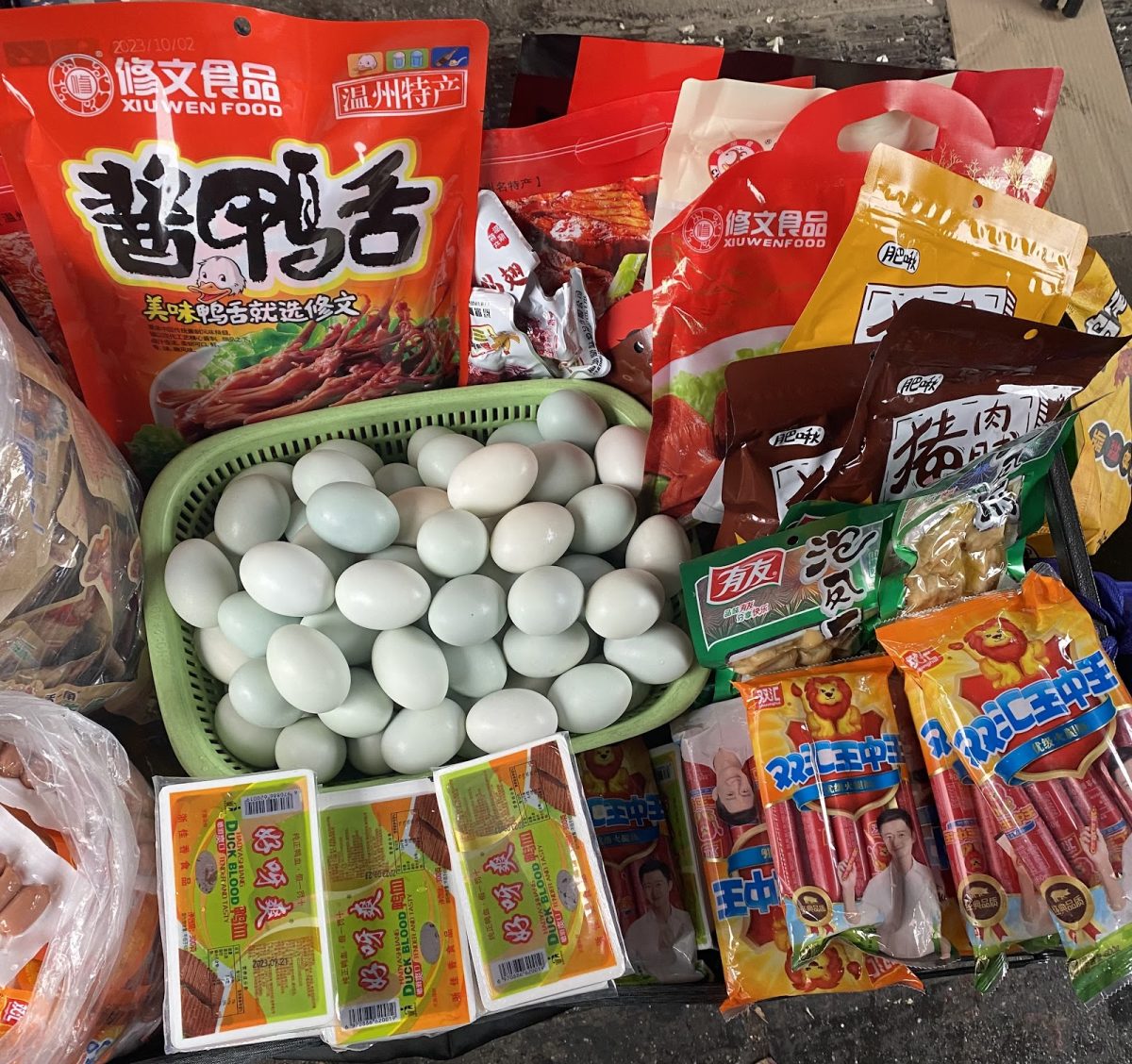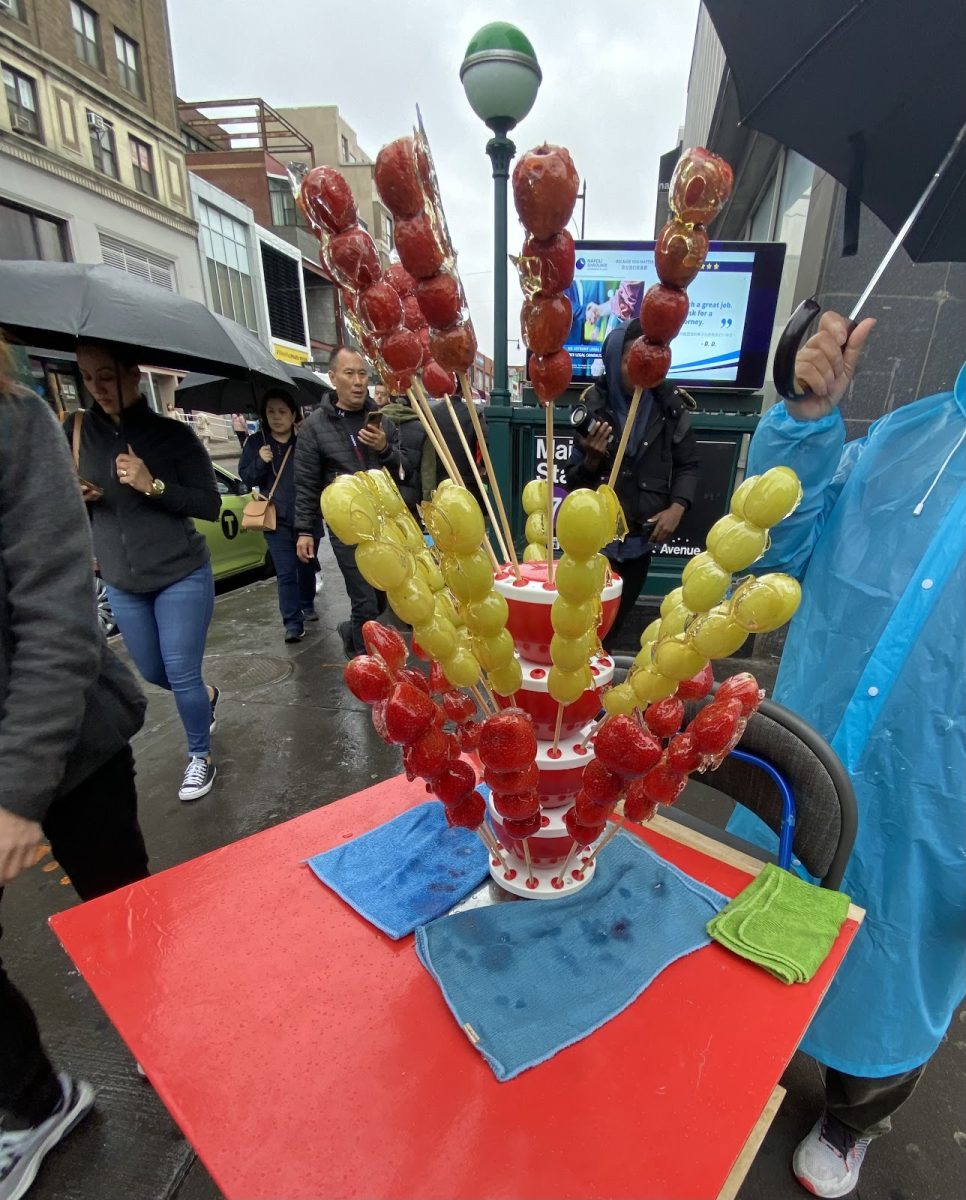Walking down the streets of Flushing, Queens, strong aromas of savory foods and colorful signs in a variety of languages are bound to permeate your senses. Dating to as far back as the 1600s, where many settlers moved to Flushing for religious freedom, the neighborhood of Flushing boasts an extremely rich cultural history.
Today, Flushing houses an extremely vast and diverse number of immigrants, making up over 50% of the city’s total population. In a city as bustling as this one, change is inevitable. People and places have come and gone, but something remains a staple at Flushing: street vending.
Regardless of the weather – rain or shine – vendors with their stalls of goods are constantly visible, awaiting potential customers. Whether you are interested in food, clothing, household appliances, or accessories, there is bound to be something to catch your eye that is sold by these vendors.
While street vending is common in Flushing, the truth of the matter is that vending is not legal in all areas of Flushing. In fact, one of the busiest areas of Flushing, Main Street, which many people endearingly call the “Heart of Flushing,” is a no-vending zone.
In 2018, a bill proposed by New York City council member Peter Koo prohibited street vending in many places including downtown Flushing, one of the most crowded areas in the city. This ban includes both licensed and unlicensed vending with the exception of veteran vendors with proper license and permits.
Despite the establishment of the bill, there is still a considerable amount of street vending occurring in broad daylight in Flushing. A reason for this loose regulation on street vending is the switch from the enforcement of street vending by the NYPD to the DWCP (Department of Consumer and Worker Protection in a bill entitled Intro 1116 in 2021.) Compared to the police, the DWCP has less power, leading to looser regulations in no vending zones.
This was especially prevalent in the years 2020-2022, after many people lost their jobs and businesses closed due to the COVID-19 pandemic. People turned to street vending as a way to earn money in order to support their families. As life has started to come back to normal after the pandemic and the regulation responsibilities shifted from the DWCP to the New York City Sanitation Department in March of 2023, the issue of street vending in areas like Flushing have once again become a topic of conflict, with both opposition and support for street vending within the city.
One of the main opponents of street vending in Flushing has been New York City Council member Sandra Ung. Council member Ung has made illegal street vending in Flushing one of her main priorities as the council member of district 20. Ung has received many complaints from her constituents regarding vendors in Flushing.
The complaints range from claims of vending being unsanitary to the creation of road traffic that can be dangerous for pedestrians – especially the elderly and disabled. There have also been complaints from small business owners in Flushing, who say that street vending is harmful to their businesses by taking customers away from them.
There has been an increase in the number of police crackdowns on vending in Flushing by the NYPD. In fact, on November 3rd, 2023, police commissioner Edward A.Caban toured Flushing with councilmember Ung as they discussed illegal vending in Flushing.
The increasing crackdowns on street vending poses an issue to many of the vendors in Flushing. The police crackdowns mean that many of these vendors are at risk of having their goods taken away, and getting tickets for vending. CityLimits reported that in 2022 there were 5,197 tickets given to vendors with a majority of the tickets issued by the NYPD (the NYPD still has the authority to enforce violations, despite not regulating street vending). The increase of ticket issuing is a problem for many of these vendors, as the tickets often come with fines that can amount to over a thousand dollars. These fines further impoverish the already struggling vendors in Flushing.
In spite of the risks, street vending is a necessary job that allows many vendors to provide for their families. “It’s really important, as it’s a form of income for many families,” said Flushing resident Darren Lin ’25. Many of these vendors don’t have a legal way to make a living. This is especially true for veterans and marginalized minorities, which make up a large percentage of the demographic in Flushing.
“It’s to make a living, we have no other way,” said a clothing vendor.
This sentiment is again echoed by another vendor – selling tupperware and kitchen goods – who said, “I can’t speak English, so I can’t find another job. We all have hardships. Now everything is so expensive, and we still need to feed our families.”
In the entirety of New York City, there are only 853 general vending licenses despite having over 20,000 vendors in the city. At the moment, applications to these licenses are closed. The scarcity and difficulty of getting a license results in illegal vending, as there is a lack of legal means in which vendors can sell.
Victoria Lu from the Street Vending Project at the Urban Justice Center, a nonprofit group advocating for street vendors in New York City, said “There is a misconception that vendors don’t want to do this legally. I often hear them tell me ‘I don’t want to break the law, I don’t want it to cause any trouble.’ I have to tell them I’m sorry, but as of right now there isn’t really anyway they can do this legally. It’s very disheartening.”
While certain groups like Veterans have an easier time getting licenses to vend, and are allowed to sell even in restricted areas like Main Street, they still face difficulties. “They face similar conditions to non-military veterans who vend. Vending is a symptom of a systemic structure. There are those who have more advantages in the system, but they are all still disadvantaged” said Lu.
Until these vendors can find another way to make a living, vending is the only way that they can make a living and the only way they have known all their lives. The matter of vending in no vending zones like Flushing is not a matter of black and white policies; there are many factors and complexities that come along with it.
It is very important for the city and the vendors to come to a compromise and resolve their differences for the benefit of everyone in Flushing, whether they are vendors, small business owners, police, or pedestrians.
“There can be a wonderful compromise: the vendors are not the city’s enemies, and they are such an important part of the city’s economy. New York City wouldn’t be New York City without the vendors,” said Lu.
While there are non profit groups like the Street Vending Project (SVP) working with the city, the DWCP, and the NYPD, there is still more work to be done. As debates over street vending have come to more media attention and controversy, tensions have been rising in places like Flushing. The rising tensions can cause potential danger to all, as biases towards vendors are being fed into, and vendors are starting to be scapegoated for larger issues in the city.
The state of street vending in Flushing isn’t perfect. In fact, in its current form, it is quite flawed. It causes foot traffic in the city, and is at times not the most regulated. At the same time, however, street vending in Flushing has a great cultural significance that makes many immigrants feel at home, and it provides a livelihood to many. While a lot of work towards the refinement of the structures of street vending need to be done, progress is being continuously made.
Currently, the SVP has been working on proposing four new bills regarding street vending. These bills aim to help street vendors in New York City in multiple ways: by making vending better for citizens by aiming to educate vendors, by making more licenses available, by amending curb traffic laws, and finally by decriminalizing vendors. One can only hope that one day that the shape of street vending in Flushing can be molded to everyone’s best interests.
Victoria Lu from the Street Vending Project at the Urban Justice Center, a nonprofit group advocating for street vendors in New York City, said “There is a misconception that vendors don’t want to do this legally. I often hear them tell me ‘I don’t want to break the law, I don’t want it to cause any trouble.’ I have to tell them I’m sorry, but as of right now there isn’t really anyway they can do this legally. It’s very disheartening.”


